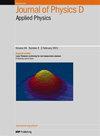正弦激励下弯曲角度对柔性电极 DBD 等离子体的影响
IF 3.1
3区 物理与天体物理
Q2 PHYSICS, APPLIED
引用次数: 0
摘要
利用冷大气压空气等离子体为公众提供先进的表面消毒和灭菌装置的需求十分迫切。研究了介质阻挡放电反应器在无弯曲和两种弯曲(角度分别为 120°和 180°)情况下的柔性印刷电路设计。对功耗、光发射光谱、动态过程、电极温度和臭氧浓度等特性进行了评估。在施加相同电压的情况下,与弯曲配置相比,非弯曲配置产生更多的 O3。180° 配置的激发物种浓度最高,但电极温度较高。两种弯曲配置都显示出灯丝向弯曲轴传播,由于高电场,在弯曲轴上观察到持续发光。在非弯曲配置中,等离子体产生的活性物质的能量效率达到 40%,并随着弯曲角度的增加而降低。这项研究为研究等离子体产生的活性物质在生物医学和环境应用中的前景提供了一种新策略。本文章由计算机程序翻译,如有差异,请以英文原文为准。
The effect of bending angle on a flexible electrode DBD plasma under sinusoidal excitation
There is a critical demand for sophisticated surface disinfection and sterilization devices accessible to the public by using cold atmospheric pressure air plasmas. A flexible printed circuit design of a dielectric barrier discharge reactor under non-bending and two bending configurations with an angle of 120° and 180° was studied. The characteristics of power consumption, the optical emission spectrum, dynamic process, electrode temperature and ozone concentration are evaluated. The non-bending configuration produces more O3, as compared to the bending configuration at the same applied voltage. The 180° configuration has a maximum concentration of excited species at the expense of higher electrode temperature. Both bending configurations demonstrated the propagation of filaments to bending axis where the continues luminescence is observed due to the high electrical field. The energy efficiency for plasma-generated reactive species reaches to 40% for non-bending configuration and decreases with the increase of bending angle. This research provides a new strategy for perspective into the plasma generated reactive species in biomedical and environmental applications.
求助全文
通过发布文献求助,成功后即可免费获取论文全文。
去求助
来源期刊
CiteScore
6.80
自引率
8.80%
发文量
835
审稿时长
2.1 months
期刊介绍:
This journal is concerned with all aspects of applied physics research, from biophysics, magnetism, plasmas and semiconductors to the structure and properties of matter.

 求助内容:
求助内容: 应助结果提醒方式:
应助结果提醒方式:


